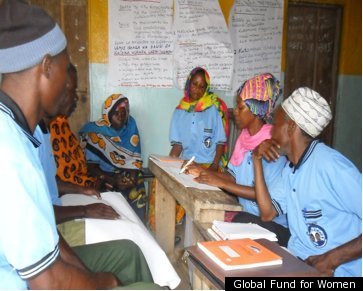
If you ever find yourself in rural Tanzania, you might come across men, women and adolescents proudly wearing a T-shirt with this quote: "It Is Possible To Reduce Maternal and Newborn Deaths, Play Your Role." As one of many educational campaigns carried out by Fly! Manage Your Family (FLEMAFA), I find that this quote carries a simple but powerful message exemplifying both FLEMAFA's founding purpose and its impact: women and infants are dying unnecessarily, and all of us -- organizations, community leaders, men, women, health workers and youth-- can play a role in helping to prevent it.
Fate or Possibility?
I can recount a story of a difficult time one of the trained village health workers had with a man from Maneromango village. He had 15 children and was strongly against family planning. The situation had intensified to the point where the man was chasing the health worker from his home even as his wife was expecting another baby. The village health worker, however, didn't give up. She continued to visit the home, advising the man on the importance of family planning and hospital delivery.

Given the the number of times the wife had previously been pregnant, as well as the position of the baby, the health worker categorized the wife as having a high-risk pregnancy. Consequently, she recommended the wife go to the nearest hospital for further assistance. The husband eventually agreed to the referral and accompanied his wife to the hospital, where she had a safe delivery. Soon afterwards, the husband agreed to permanent contraception and asked the health worker to pay regular visits to his home to provide more information on sexual and reproductive health issues.
In Tanzania, one in 10 women die giving birth, and maternal death is traditionally justified as the fate of being a woman. Due to limited income, lack of adequate information and the transfer of traditional customs to younger generations, the majority of pregnant women seek the assistance of Traditional Birth Attendants (TBAs), many of whom do not have the necessary skills to facilitate a safe childbirth. FLEMAFA was founded in 2004 by professional midwives and reproductive health educators in rural Tanzania. The founders saw firsthand the need for greater education, training and awareness-raising on women's reproductive issues and believed this was essential to reducing maternal and infant death rates.
Everyone Has a Role
High maternal mortality rates are often deeply rooted. They can be attributed to lack of information at the community level, lack of training among TBAs, and restrictive cultural norms. FLEMAFA addresses this reality by reaching out to different members of the community and focusing on their particular role in improving maternal health. By directly reaching out to families FLEMAFA aims to dispel local misconceptions surrounding pregnancy (such as the dangers of contraception, dietary restrictions for pregnant women, and the harmful effects of prenatal care). FLEMAFA offers community workshops on family planning and discusses specific measures to facilitate a safe birth, including the development of a birthing plan to reduce obstetric emergencies. They train TBAs and traditional healers who are held in high esteem in their communities to disseminate accurate information about maternal care. FLEMAFA believes that it is critical to engage men in its workshops, recognizing the critical role they can play in supporting their wives and families and mobilizing community support.
Community Engagement Leads to Strong Results
FLEMAFA's community education campaigns and trainings of TBAs have led to positive shifts in the quality of maternal care. The number of hospital referrals and safe deliveries have increased, due to better trained TBAs who can identify and deal with pregnancy complications, and more informed women who can mitigate risks on their own. In 2011, FLEMAFA reached more than 10,000 people through educational campaigns and trainings. This outreach has led to a transformation in community beliefs around family planning and women's reproductive health in general, even among the most resistant community members.

Over the past three years, the Global Fund for Women and Johnson and Johnson have partnered to support FLEMAFA in its efforts to lower maternal and infant mortality rates. During this time, we have marveled at the accomplishments of FLEMAFA despite the challenge of limited resources and a staff comprised entirely of volunteers, most of whom are retired midwives. Their successful approach to community engagement inspires us that everyone plays a key role to reduce maternal and infant mortality. You can do your part as well. Make a donation to the Global Fund for Women and support groups like FLEMAFA all over the world that are implementing creative and effective solutions to improve maternal health.